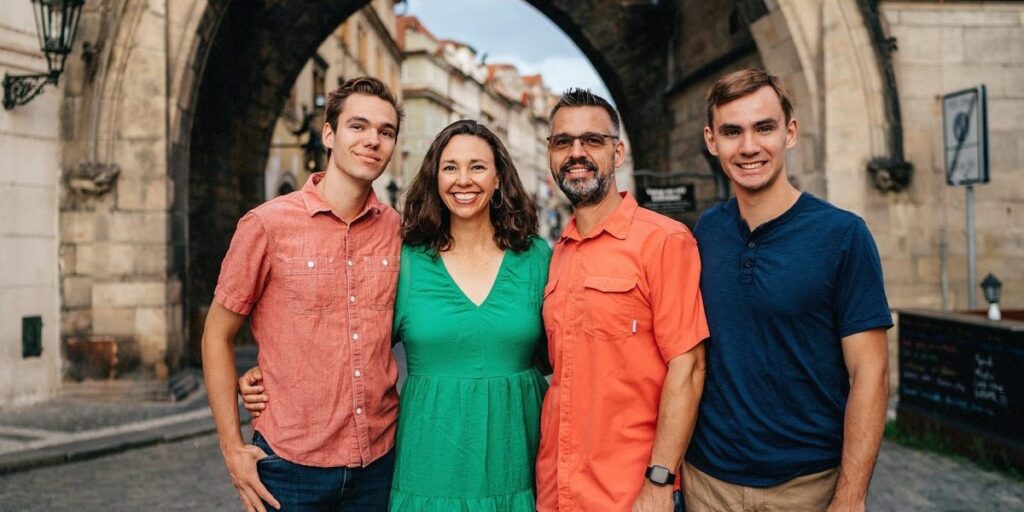This as-told-to essay is based on a conversation with Tiffany Fite, a graduate student at Masaryk University in Brno, Czech Republic. It has been edited for length and clarity.
My family has never been one to follow a traditional path. When our two sons were in middle school, we sold our house in Washington, DC, and took a two-year road trip around the US.
We got an RV, “road-schooled” the kids, and took on part-time jobs to fund our trip. The experience taught us that exploring things outside the typical American lifestyle was possible.
So when it was time for my sons, now 22 and 21, to think about college, we were open to different possibilities.
After high school, both sons took a gap year to decide on their paths. They looked at everything from community colleges to trade schools to the military. They eventually decided that going overseas was their best choice: Tuition was much more affordable, and the bachelor programs were mostly three years.
My older son went to the Anglo-American University in Prague to study business administration in 2021, and my younger son went to the University of Pécs in Hungary a year later to study archaeology.
My husband and I were inspired to do the same
Back in the US, I worked as a consultant on organizational change management. My husband did contract work as a lawyer at an energy firm.
Both our education paths were untraditional. It took me almost 30 years to graduate from high school because I immediately jumped into a career. Instead, I took classes throughout my professional life. I didn’t earn my bachelor’s degree until 2021, when I was 48.
Similarly, my husband, now 51, was 33 when he got his law degree.
Seeing our children move to Europe for college sparked the idea that we could obtain a graduate degree in a field that interests us at an affordable price. The cost of living in certain countries is not very high compared to Idaho, where we live in the US. It would also allow us to live in a foreign country for two years and travel around Europe.
Tiffany Fite
Although I did not doubt that a graduate degree could benefit us professionally, we knew we didn’t want to invest too much, as we saw it as more of an extracurricular.
We eventually decided on Masaryk University in Brno, Czech Republic, where tuition costs 3,000 Euros, or around $3,300 a year. We did not consider schools in the US.
In June 2023, my husband and I resigned from our jobs and moved to Brno.
I decided to pursue a graduate degree in cultural sociology, while my husband chose to study energy policy.
I enjoy learning as an older student
Tiffany Fite
Brno is a young and vibrant student city. We are older students in our graduate programs, where the average student is 32 years old.
Yes, some people look at us a little funny if we go to a doctor or a government appointment and say we’re here on a student visa. But once we explain, it’s not a big deal.
Being older, though, I take my education more seriously than I would have if I were 30 years younger. I enjoy being able to study and sit in a classroom for the first time in my life and just dedicate my time to studying. It’s a gift and a true indulgence for me at this age.
I also appreciate having an international peer group here, whom we call colleagues. My colleagues are from all over the world. I have Nigerian, Bangladeshi, Iranian, Norwegian, and Polish peers, and it’s wonderful to be able to immerse myself in a very international culture.
For the time being, we are living on savings
Tiffany Fite
Our home in the US is being rented, so we earn a small income from that, which helps defray some of our costs.
In Brno, we spend around $1,000 on our monthly rent and a little extra for a gym membership. We walk everywhere or take public transportation, which is affordable.
Moving to the Czech Republic was a bonus because we could be closer to our older son, who has since graduated and works full-time in Prague.
One concern that we had was leaving our aging parents. Ultimately, if anything were to happen, we would immediately get on a plane home.
It’s a risk we took for sure. Our family and friends would smile and say, “That’s what you guys do. You people rebel against the way things are supposed to be done. I wish you luck.” With that, we have some people who are our greatest cheerleaders.
We’re getting older, and we know that this will probably be the last time we can unravel our life to do this.
As long as we can be self-sufficient and continue to pay our bills, we’re open to staying abroad after we graduate next year. It depends on where our sons will land and what they do. We’re keeping our options open.
Do you have a story about choosing to attend college outside the US that you want to share? Get in touch with the reporter, Erin: eliam@businessinsider.com.

